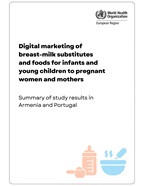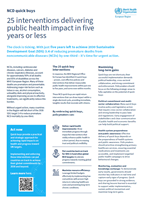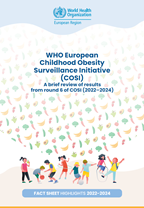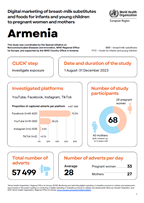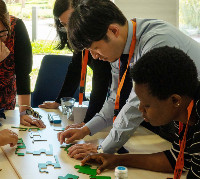Nutrition
A balanced and varied diet, composed of a wide range of nutritious and tasty foods, adds years to life and life to years. Nevertheless, the burden of disease associated with poor nutrition continues to grow in the WHO European Region. Unhealthy diets, overweight and obesity contribute to a large proportion of noncommunicable diseases (NCDs), including cardiovascular diseases, type 2 diabetes and some cancers, which together are the main killers in the Region. National surveys in most countries indicate excessive consumption of energy, saturated fat, trans fats, sugar and salt; as well as low consumption of vegetables, fruits and whole grains; and increasing numbers of people with obesity – all of which not only shorten life expectancy, but also harm the quality of life. Simultaneously, in some countries and among some vulnerable groups, undernutrition remains a concern.
Helping countries to promote good nutrition and healthy, sustainable diets as an effective measure to reduce NCDs is one of the priorities of the European Programme of Work 2020–2025 (EPW), agreed by all 53 Member States of the WHO European Region. Many Member States have government-approved policies that aim to promote healthy and sustainable diets, tackle the growing rates of obesity, and ensure good nutrition and food security. The policy development process in the Region has demonstrated that improvements to nutrition and diet require the engagement of many different government sectors and need to involve action by both the public and private sectors.
The EPW encourages action in a range of policy areas through a whole-of-government, health-in-all-policies approach. The goal is to improve the availability, affordability and attractiveness of healthy and sustainable foods, with a view to improving the overall quality of the population’s diet and ultimately health and well-being.
WHO/Europe works with Member States to develop and improve government policies to promote healthy and sustainable diets, addressing these high rates of obesity and diet-related NCDs across the Region.
This work is conducted through a range of activities including:
- promoting, protecting and supporting breastfeeding, and addressing the inappropriate marketing of poor nutritional quality foods for infants and young children;
- promoting school nutrition policies;
- restricting digital marketing of unhealthy foods and non-alcoholic beverages to children and adolescents;
- applying an integrated approach to brief interventions on NCD risk factors in primary health care;
- promoting policies to reduce salt, fats and sugars in the diet, including food product reformulation;
- supporting fiscal policies including sugar-sweetened beverage tax and front-of-pack labelling;
- promoting healthy and sustainable diets.
WHO/Europe works with Member States to collect data and develop and improve policies across different government sectors and stakeholders to protect the health of populations.








